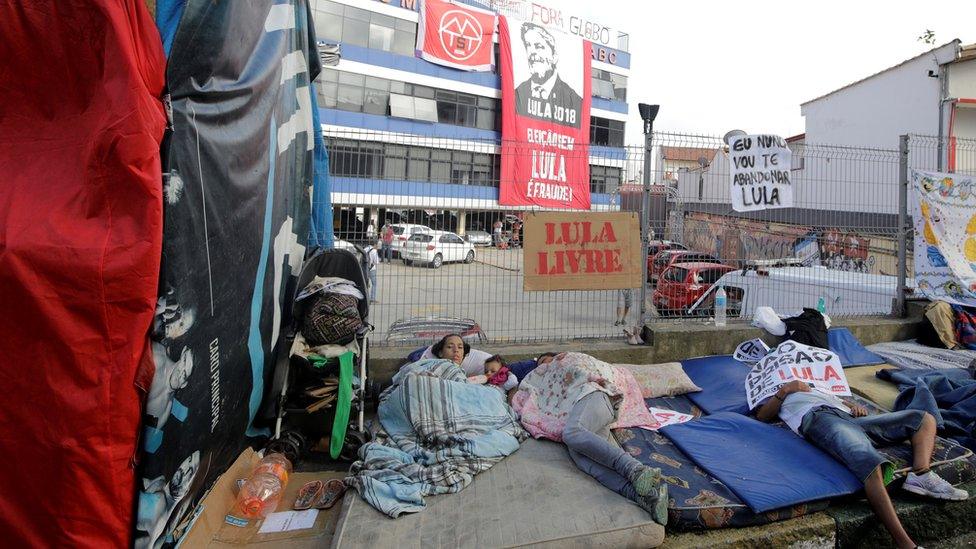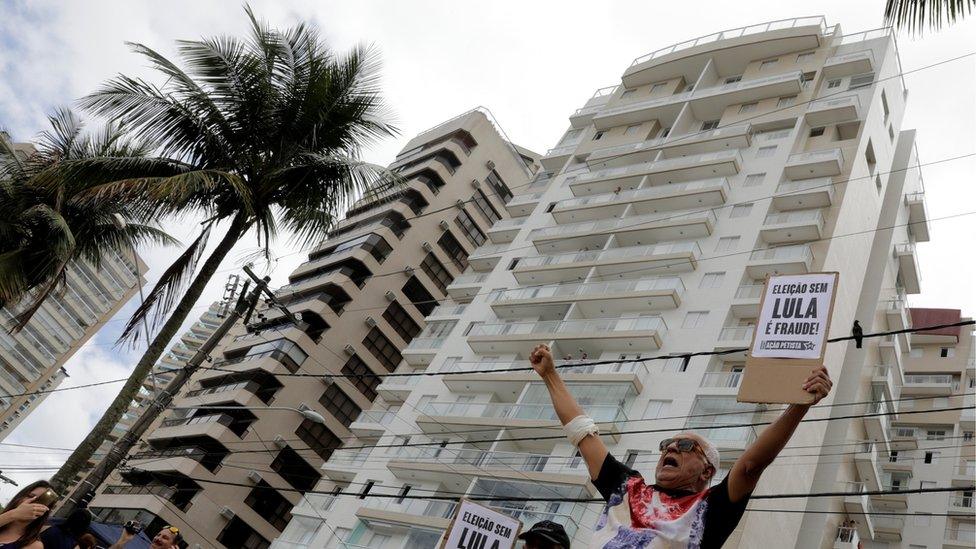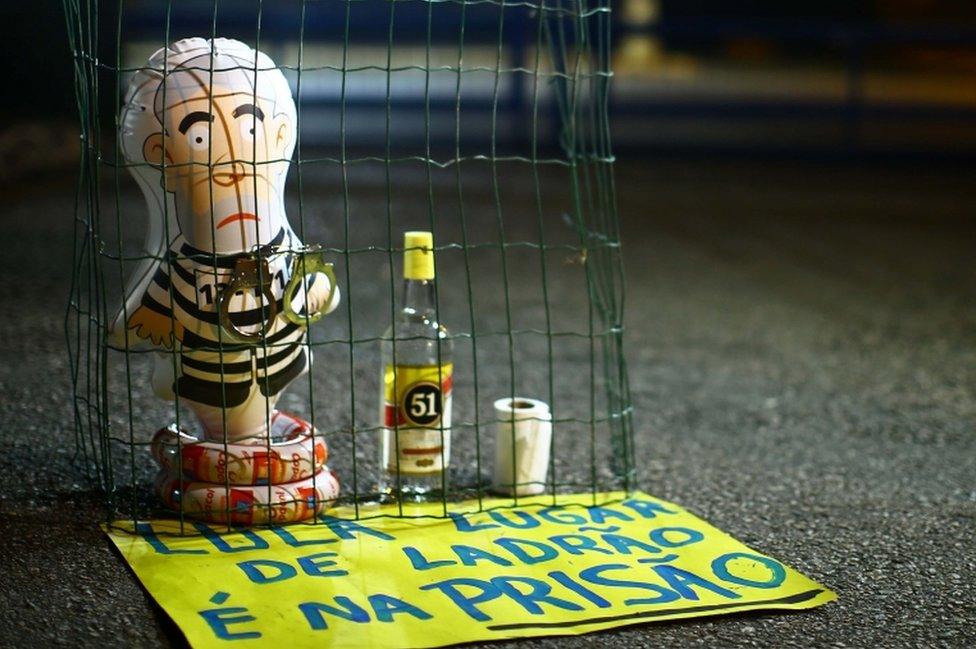Supporters of Brazil's Lula stop him surrendering
- Published
Supporters blocked Lula's car
Supporters of ex-Brazilian President Luis Inácio Lula da Silva have stopped him surrendering to police after he agreed to end a stand-off over his prison sentence.
Scores of them blocked his car leaving the trade union building near Sao Paulo where he has been staying.
He says he will give himself up despite saying he is innocent of the corruption charges of which he was convicted.
Two last-minute appeals to have his arrest warrant suspended had failed.
Allow X content?
This article contains content provided by X. We ask for your permission before anything is loaded, as they may be using cookies and other technologies. You may want to read X’s cookie policy, external and privacy policy, external before accepting. To view this content choose ‘accept and continue’.
Lula was the frontrunner for October's presidential election but his jailing will leave the race wide open.
The former metalworker and trade union activist is an iconic figure for the left in Latin America. He was the first left-wing leader to make it to the Brazilian presidency in nearly half a century.
The crowd had gathered for a Mass to commemorate the former leader's late wife, Marisa Leticia.
What did he say to supporters?
On Saturday, flanked by his impeached successor as president, Dilma Rousseff, the 72-year-old delivered an impassioned 55-minute speech.
Lula is carried through a crowd of his supporters
"I will comply with the order and all of you will become Lula," he told the crowd in Sao Bernardo do Campo. "I'm not above the law. If I didn't believe in the law, I wouldn't have started a political party. I would have started a revolution."
Promising to come out of his legal troubles "bigger and stronger", he said: "I was born with a short neck so I can keep my head high."
When he left the stage, he was carried on the shoulders of delighted supporters chanting "Free Lula!"
He was expected to leave the building through a garage but supporters told BBC News the workers inside were keeping him there, chanting "We won't let him leave".
Allow X content?
This article contains content provided by X. We ask for your permission before anything is loaded, as they may be using cookies and other technologies. You may want to read X’s cookie policy, external and privacy policy, external before accepting. To view this content choose ‘accept and continue’.
Allow X content?
This article contains content provided by X. We ask for your permission before anything is loaded, as they may be using cookies and other technologies. You may want to read X’s cookie policy, external and privacy policy, external before accepting. To view this content choose ‘accept and continue’.
What was Lula convicted of?
Lula says his conviction was designed to stop him from running for president again.
In an order issued on Thursday, federal judge Sergio Moro said Lula had to present himself before 17:00 local time (20:00 GMT) on Friday at the federal police headquarters in the southern city of Curitiba.

Lula posters were hung on fencing at the union building
The charges against Lula came from an anti-corruption investigation known as Operation Car Wash, which has embroiled top politicians from several parties.
He was convicted of receiving a renovated beachfront apartment worth some 3.7m reais ($1.1m, £790,000), as a bribe from engineering firm OAS.

Lula is said to have accepted a flat in this block in Guaruja as a bribe
The defence says Lula's ownership of the apartment has never been proven and that his conviction rests largely on the word of the former chairman of OAS, himself convicted of corruption.
"I'm the only person being prosecuted over an apartment that isn't mine," Lula said on Saturday.
Who is Lula?
Lula served as president from 2003-2011. Despite a lead in opinion polls ahead of October's election, he remains a divisive figure.
Allow X content?
This article contains content provided by X. We ask for your permission before anything is loaded, as they may be using cookies and other technologies. You may want to read X’s cookie policy, external and privacy policy, external before accepting. To view this content choose ‘accept and continue’.
While he was in office, Brazil experienced its longest period of economic growth in three decades, allowing his administration to spend lavishly on social programmes.

Lula's opponents protested outside the federal police headquarters where he was meant to surrender. The sign reads: "Lula, the place for a thief is prison."
Tens of millions of people were lifted out of poverty thanks to the initiatives taken by his government and he left office after two consecutive terms (the maximum allowed in Brazil) with record popularity ratings.
What happens next?
Supreme Court Justice Edson Fachin rejected Lula's appeal on Saturday, a day after his appeal to the Superior Court was declined.
The two courts did not re-examine Lula's conviction, only whether legal procedures were followed correctly and his constitutional rights were observed.
Allow X content?
This article contains content provided by X. We ask for your permission before anything is loaded, as they may be using cookies and other technologies. You may want to read X’s cookie policy, external and privacy policy, external before accepting. To view this content choose ‘accept and continue’.
Ordering his surrender on Thursday, Judge Moro said the former president would have a separate cell with its own toilet in Curitiba.
He would not be handcuffed if he came quietly, the judge promised.
As a convict, Lula would normally be barred from standing for election in October but Brazil's top electoral court reserves the final decision if and when he submits his candidacy.
Lula was convicted last July and originally sentenced to nine and a half years in prison.
He lost his first appeal against the sentence in January, when the appeals court not only upheld his conviction, but increased the sentence to 12 years.
Until recently, defendants in Brazil were allowed to remain free until their final appeal had been exhausted but a 2016 ruling from a lower court allowed for defendants to be sent to jail after a failed first appeal.